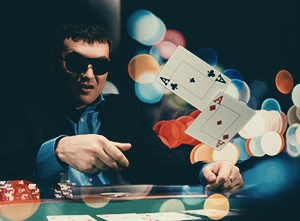Folding a Made Hand on the Flop
 As I enjoy playing at the lower limit tables, and because I am one of the worst bankroll managers alive, I play many hours with poor poker players. This is not only profitable; it also gives me plenty of fodder when it comes to subjects to write about. I see just about every mistake that can be made, and many that I have made in the past. One of the biggest mistakes that new Texas holdem players make, especially in limit holdem, is when they hit any part of a flop, they play the hand to the end, no matter what the cost.
As I enjoy playing at the lower limit tables, and because I am one of the worst bankroll managers alive, I play many hours with poor poker players. This is not only profitable; it also gives me plenty of fodder when it comes to subjects to write about. I see just about every mistake that can be made, and many that I have made in the past. One of the biggest mistakes that new Texas holdem players make, especially in limit holdem, is when they hit any part of a flop, they play the hand to the end, no matter what the cost.
Good poker players have a solid understanding of pot odds and realize when it isn’t profitable to continue with a hand. For example, in a limit Texas holdem game where 5 players see the flop, you have K Q and the flop is A Q 3. You have second pair, but there is almost no chance you have the best hand. The odds of five players seeing a flop and none of them holding an Ace are very slim. So on this hand, you should check and fold to any action. Even in the rare event that you would have the best hand on the flop, any King, Jack or Ten may very well complete a straight draw for an opponent.
However, these are the types of hands that I see poor players “marrying” and losing many bets on. This habit is even reinforced occasionally when they luck into two pair on the turn or river and win a decent sized pot. So how do you recognize when a hand should be folded and when you need to continue?
There are many things you must consider each time you are involved in a hand, including the following.
- How good is my hand, and if it is not the best hand presently, how likely is it to improve to the best hand?
- What range of hands are my opponents likely to hold and how likely is it they may improve to better hands?
- What do my opponents think that I am holding?
Though none of these questions usually lead to exact answers, the closer you can estimate the answers, the closer you will come to making the correct decision. Even the best players in the world are not right all of the time, but they have practiced and observed enough to be right more often than they are wrong. This is where you need to be and where you should always strive to get.
The next time you find yourself in a situation where you are either getting ready to make a decision at the poker table based on anything other than solid information or are unsure of the correct play, ask yourself the questions listed above and see what you feel is most likely the correct decision. Continue to watch the hand even if you decide to fold to see if you were correct. Continuously refining your skills through this type of effort will only lead to better play.